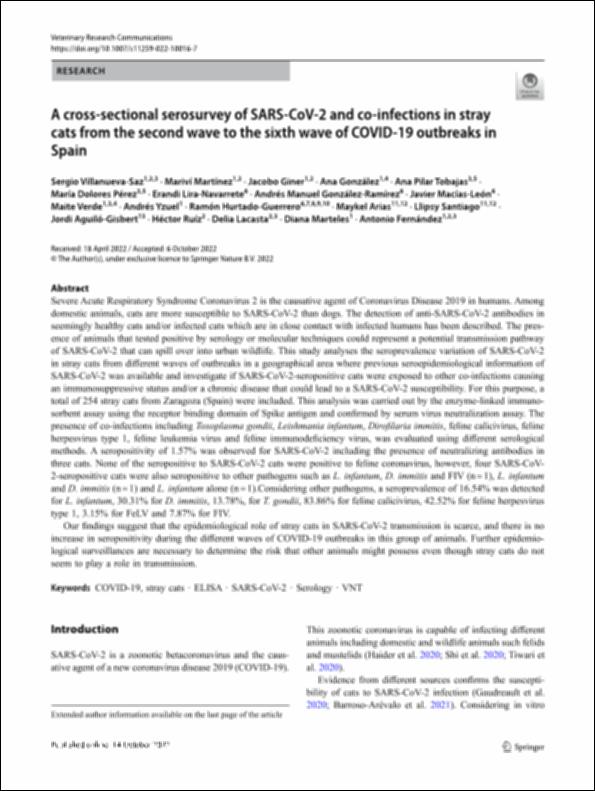Por favor, use este identificador para citar o enlazar este ítem:
http://hdl.handle.net/10637/14295A cross-sectional serosurvey of SARS-CoV-2 and co-infections in stray cats from the second wave to the sixth wave of COVID-19 outbreaks in Spain
| Título : | A cross-sectional serosurvey of SARS-CoV-2 and co-infections in stray cats from the second wave to the sixth wave of COVID-19 outbreaks in Spain |
| Autor : | Villanueva Saz, Sergio Martínez, Mariví Giner, Jacobo González, Ana Tobajas, Ana Pilar Pérez, María Dolores Aguiló Gisbert, Jordi |
| Materias: | COVID-19.; COVID-19 (Disease); Cats - Coronavirus infections.; Gatos - Infecciones por coronavirus.; Serology.; SARS-CoV-2 (Virus); Serología. |
| Editorial : | Springer Nature |
| Citación : | Villanueva-Saz, S., Martínez, M., Giner, J., González, A., Tobajas, A. P., Pérez, M. D., Lira-Navarrete, E., González-Ramírez, A. M., Macías-León, J., Verde, M., Yzuel, A., Hurtado-Guerrero, R., Arias, M., Santiago, L., Aguiló-Gisbert, J., Ruíz, H., Lacasta, D., Marteles, D. & Fernández, A. (2023). A cross-sectional serosurvey of SARS-CoV-2 and co-infections in stray cats from the second wave to the sixth wave of COVID-19 outbreaks in Spain. Veterinary Research Communications, vol. 47, i. 2 (jun.), pp. 615–629. DOI: https://doi.org/10.1007/s11259-022-10016-7 |
| Resumen : | Severe Acute Respiratory Syndrome Coronavirus 2 is the causative agent of Coronavirus Disease 2019 in humans. Among domestic animals, cats are more susceptible to SARS-CoV-2 than dogs. The detection of anti-SARS-CoV-2 antibodies in seemingly healthy cats and/or infected cats which are in close contact with infected humans has been described. The presence of animals that tested positive by serology or molecular techniques could represent a potential transmission pathway of SARS-CoV-2 that can spill over into urban wildlife. This study analyses the seroprevalence variation of SARS-CoV-2 in stray cats from different waves of outbreaks in a geographical area where previous seroepidemiological information of SARS-CoV-2 was available and investigate if SARS-CoV-2-seropositive cats were exposed to other co-infections causing an immunosuppressive status and/or a chronic disease that could lead to a SARS-CoV-2 susceptibility. For this purpose, a total of 254 stray cats from Zaragoza (Spain) were included. This analysis was carried out by the enzyme-linked immunosorbent assay using the receptor binding domain of Spike antigen and confirmed by serum virus neutralization assay. The presence of co-infections including Toxoplasma gondii, Leishmania infantum, Dirofilaria immitis, feline calicivirus, feline herpesvirus type 1, feline leukemia virus and feline immunodeficiency virus, was evaluated using different serological methods. A seropositivity of 1.57% was observed for SARS-CoV-2 including the presence of neutralizing antibodies in three cats. None of the seropositive to SARS-CoV-2 cats were positive to feline coronavirus, however, four SARS-CoV- 2-seropositive cats were also seropositive to other pathogens such as L. infantum, D. immitis and FIV (n = 1), L. infantum and D. immitis (n = 1) and L. infantum alone (n = 1).Considering other pathogens, a seroprevalence of 16.54% was detected for L. infantum, 30.31% for D. immitis, 13.78%, for T. gondii, 83.86% for feline calicivirus, 42.52% for feline herpesvirus type 1, 3.15% for FeLV and 7.87% for FIV. Our findings suggest that the epidemiological role of stray cats in SARS-CoV-2 transmission is scarce, and there is no increase in seropositivity during the different waves of COVID-19 outbreaks in this group of animals. Further epidemiological surveillances are necessary to determine the risk that other animals might possess even though stray cats do not seem to play a role in transmission. |
| Descripción : | Este artículo se encuentra disponible en la siguiente URL: https://link.springer.com/article/10.1007/s11259-022-10016-7 En este artículo de investigación también participan: Erandi Lira-Navarrete, Andrés Manuel González-Ramírez, Javier Macías-León, Maite Verde, Andrés Yzuel, Ramón Hurtado-Guerrero, Maykel Arias, Llipsy Santiago, Héctor Ruíz, Delia Lacasta, Diana Marteles & Antonio Fernández. |
| URI : | http://hdl.handle.net/10637/14295 |
| Derechos: | http://creativecommons.org/licenses/by-nc-nd/4.0/deed.es |
| ISSN : | 0165-7380. 1573-7446 (Electrónico) |
| Idioma: | es |
| Fecha de publicación : | jun-2023 |
| Centro : | Universidad Cardenal Herrera-CEU |
| Aparece en las colecciones: | Dpto. Medicina y Cirugía Animal |
Los ítems de DSpace están protegidos por copyright, con todos los derechos reservados, a menos que se indique lo contrario.


